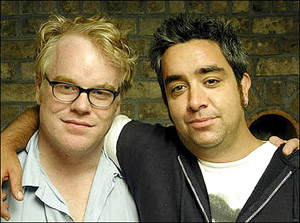
Hoffman is currently directing Stephen Adly Guirgis' latest play, The Little Flower of East Orange, a LAByrinth Theatre Company and Public Theater co-production. It's the first collaboration between the two artists, the previous four being The Last Days of Judas Iscariot, In Arabia We'd All Be Kings, Jesus Hopped The 'A' Train and Our Lady of 121st Street. Hoffman, who is co-artistic director of the LAByrinth, has directed plays by other playwrights, but primarily his directing career has focused and the gritty tales of comic urban woe that Guirgis spins out. (The first play he ever mounted was a Guirgis drama.) The partnership is particularly remarkable in that it has paralleled Hoffman's rise as a film actor — a career surge that has done nothing to limit the actor's commitment to the playwright or the company. Hoffman spoke to Playbill.com about the new production.
Playbill.com: This is the fifth play of Stephen Adly Guirgis that you've directed, isn't it?
Philip Seymour Hoffman: Yup.
Playbill.com: How do you two work together as playwright and director?
PSH: Uh, he hangs back while he's finishing it. Once he delivers it, he's around throughout. There's a lot of discussion while he's writing it. We both make suggestions about the writing.
Playbill.com: Having directed so many of his plays at this point, what do you feel are the main concerns addressed in his work?
PSH: The idea of faith comes up. The idea of how to lay down your past, and what it is to be a man, an adult; what that really means under the surface of that idea — emotionally, spiritually. It's mostly about people who are coming to terms with the fact that they're not children anymore. And that's a painful thing.
Playbill.com: Is it difficult sometimes for you to understand the gritty urban world he's creating? It's a far cry from your upbringing in upstate New York.
 |
||
| Philip Seymour Hoffman and Stephen Adly Guirgis |
PSH: I think it's a continuation. But the main characters in the play are not his typical main protagonists. They're more of a family dealing with each other than you usually see [in his plays]. I don't think I've read a play of his where a family was the center of it. It's always been a motley crew of people living in a certain area who are forced to deal with each other in a certain institution, or something like that.
Playbill: How did Ellen Burstyn get involved? That's a different sort of casting for you and Guirgis. In the past, your productions have relied on the LAByrinth ensemble primarily.
PSH: She was sent the play and she really liked it. Stephen and I went to meet her and she wanted to do it.
Playbill.com: Do you make it a point to be involved in at least one LAByrinth production a season?
PSH: Not really. It just works out that way.
Playbill.com: A lot of artists who have had your success in film would have drifted away from theatre after a while. But your commitment has seemed pretty steady.
PSH: Well, I've been with the company for 13-14 years now. It's just part of what I do, it's part of my life. And as co-artistic director, I'd really have to sever myself in a big way in order to walk away from it. And I don't have a desire to do that.
Playbill.com: You've just finished filming the movie version of Doubt, directed by its author John Patrick Shanley. How was that?
PSH: It was great. I loved working with Meryl [Streep, his co-star]. And John did a great job directing. He knew what he wanted and he was very open and very patient with everybody involved, and he saw it through. The story is expanded, but the play is there.











